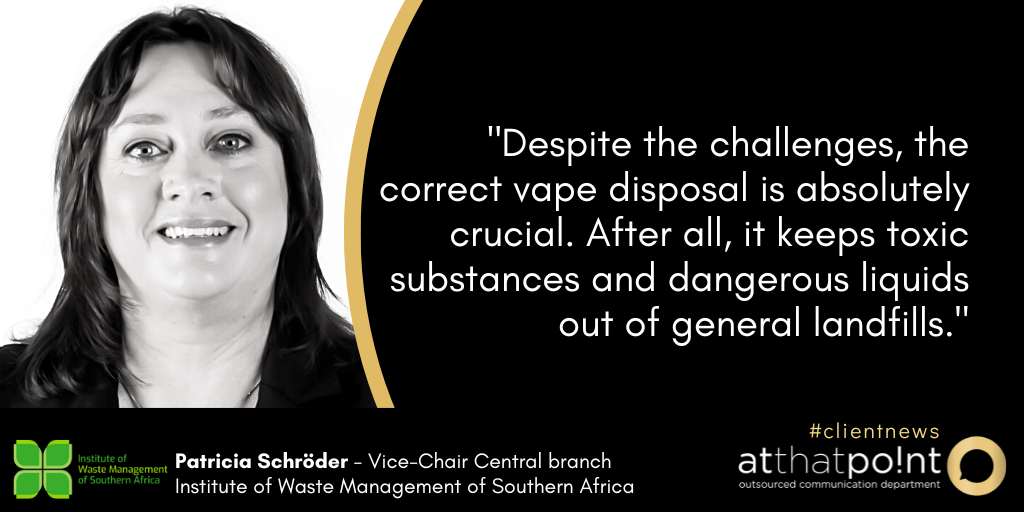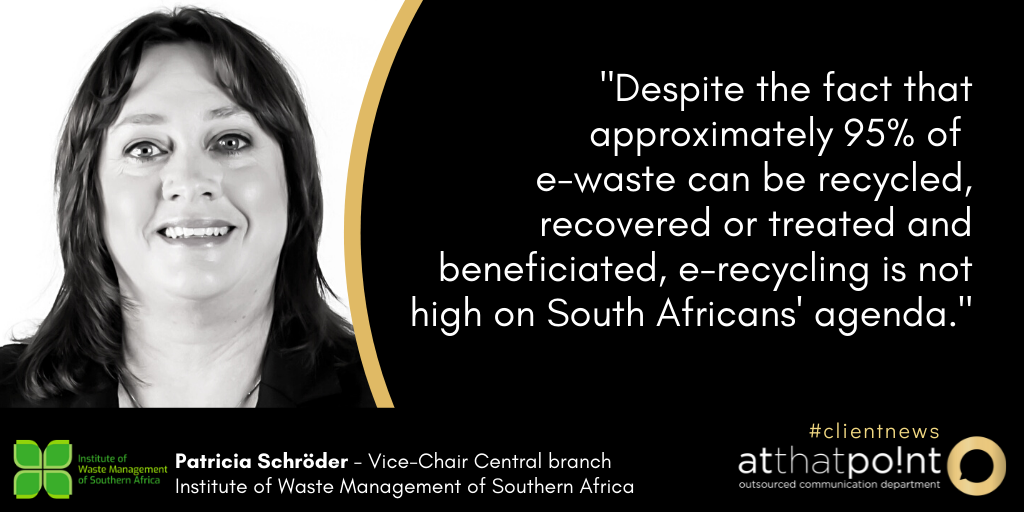 As vaping grows in popularity, unfortunately so does the harm it causes to the environment. It is especially trendy amongst younger users, though many seem to be unaware that vapes are actually electronic waste, cautions Patricia Schröder, Vice President at The Institute of Waste Management of Southern Africa (IWMSA). Toxin leaks due to incorrect disposal can be hazardous A "vape," or electronic cigarette, is a device that heats up a liquid to create a vapor that the user then inhales. Since they have a heating element and lithium-ion batteries, vapes are considered e-waste. But vape waste disposal is a big undertaking, because of the many chemicals and materials that are used in them. “Despite the challenges, the correct vape disposal is absolutely crucial. After all, it keeps toxic substances and dangerous liquids out of general landfills,” explains Schröder. “Even in the form of residues, these toxins can leak into natural habitats and river systems, where they can eventually contaminate our freshwater sources.” She says these dangerous elements can, however, be kept out of the environment by recycling and good product management. “Additionally, the materials, including the harmful components, can be recovered for use in other applications.” Informed users are responsible users Schröder notes that all electronic waste was banned from landfills in August 2021. “And due to the fact that vape cartridges contain both electronic components and packaging, they are included in this legislation. However, there is definitely still a need for greater acceptance and understanding on the part of both manufacturers and consumers.” She says vapers should ensure their disposable cartridges are collected through a “Mandatory Take Back-program” and then delivered to a recycling facility for environmentally sound management of the waste and to recover resources. “Return the used vape cartridges to the merchants who sold them, and preferably, only support vendors that will properly manage the vape cartridges and have proof of this,” she elaborates. “Under no circumstance dispose of your vape cartridges in normal waste bins as these go to general landfill and will cause pollution of this environment.” According to Schröder, so-called “end-of-life care” and recycling of vape goods are specialised tasks that call for very specific technology, expertise, and management approaches. “It is the only way we can ensure environmentally sound management that does not adversely affect the environment or the handlers of the waste products.” ENDS MEDIA CONTACT: Rosa-Mari Le Roux, [email protected], 060 995 6277, www.atthatpoint.co.za For more information on IWMSA please visit: Website: http://www.iwmsa.co.za/ Twitter: @IWMSA LinkedIn: Institute of Waste Management of Southern Africa Facebook: Institute of Waste Management of Southern Africa
0 Comments
Despite the fact that approximately 95% of e-waste can be recycled, recovered or treated and beneficiated, e-recycling is not high on South African’s agenda.
This according to Patricia Schröder, Vice-Chair of the Central branch of the Institute of Waste Management of Southern Africa (IWMSA). International e-Waste Day takes place on 14 October and this year’s focus is the role of consumers in improving rates of re-use and recycling. “Local recycling rates are very low and it’s a major problem,” Schröder warns. “For example, only between 2 and 2.5% of waste lighting, and between 10 and 12% of other waste electrical and electronic equipment is recycled.” The most common forms of e-waste include small domestic appliances, household portable batteries, lighting, and IT and communication equipment and consumables, such as printer cartridges. “Big manufacturers were not obligated to play their part voluntarily,” says Schröder. “But in May this year, the Extended Producer Responsibility (EPR) regulations were published. It makes the manufactures and producers responsible for the end of life management of their products.” The new regulations will be implementable from 5 November 2021. According to Schröder, this will be a starting point to see how effective these regulations will be to improve collection and recycling rates. “Producers must sign up by before 4 November 2021 to one of the various existing industry Producer Responsibility Organisations (PRO’s) to become compliant and take responsibility for their products’ end-of-life management. This will also drive consumer awareness, environmental improvement, innovation, job and skills creation among many other benefits.” She adds that the IWMSA can assist companies with information on becoming compliant with the EPR regulations How to manage corporate and individual e-waste If each individual and business plays their part, it can make a big difference. “Avoid impulse buying of electronic products,” Schröder advises. “Ask yourself: Do I really need this item? “Buy items that are recyclable and check the labelling. Repair and re-use all items to extend the lifespan of the product. At the end of the lifespan or when the product is not required any longer, ensure that you drop off your e-waste at collection sites where available; or find a Department of Environmental Affairs-legally compliant, licensed recycling facility for environmentally sound management.” Businesses should also insist on compliance documentation for traceability and auditing purposes. “If these services are contracted out, ensure that your contractors are following the correct chain of custody for compliance.” She warns buyers mustn’t be tempted by illicit unlicensed traders or companies that pay a small fee for the items and claim to recycle them. “All they do is pick out the valuable fractions with negative environmental impacts to sell to the highest bidder - like scrap dealers or illegal or unethical e-waste dealers - and the balance is then illegally discarded with general waste,” she explains. “And don’t support organisations that charge you to “smash” your e-waste in a room to vent your frustrations. Not only is this practice a health, safety and environmental risk, but these smashed items are usually illegally discarded,” Schröder concludes. ENDS MEDIA CONTACT: Rosa-Mari Le Roux, 060 995 6277, [email protected], www.atthatpoint.co.za For more information on PASA please visit: Website: http://www.iwmsa.co.za/ Twitter: @IWMSA LinkedIn: Institute of Waste Management of Southern Africa Facebook: Institute of Waste Management of Southern Africa |
AuthorWrite something about yourself. No need to be fancy, just an overview. Archives
June 2024
Categories
All
|


 RSS Feed
RSS Feed